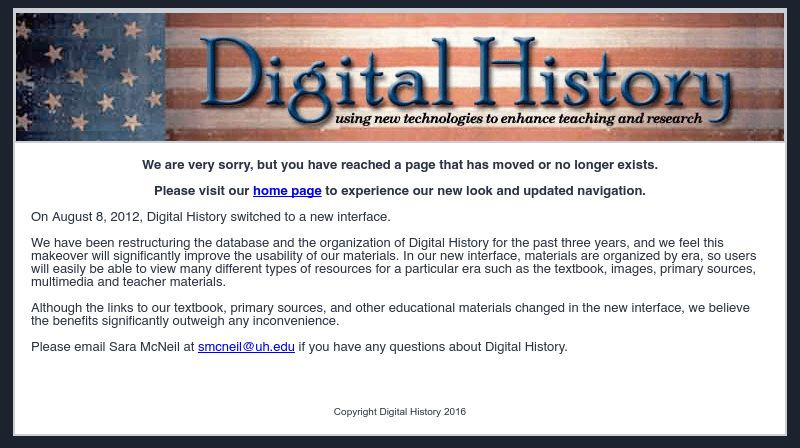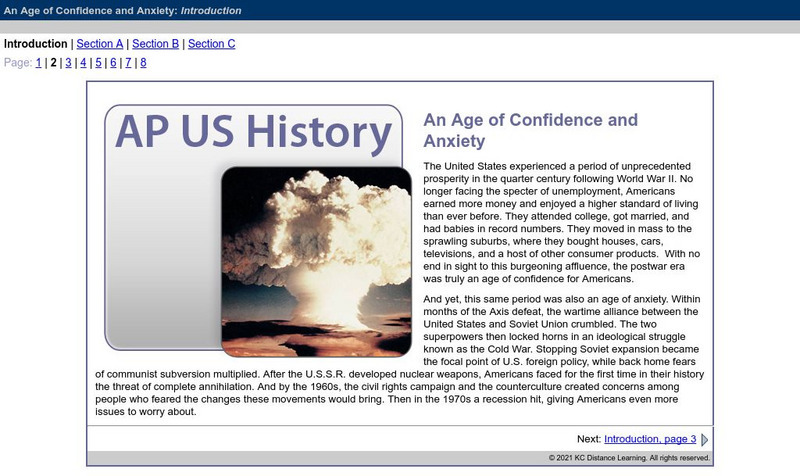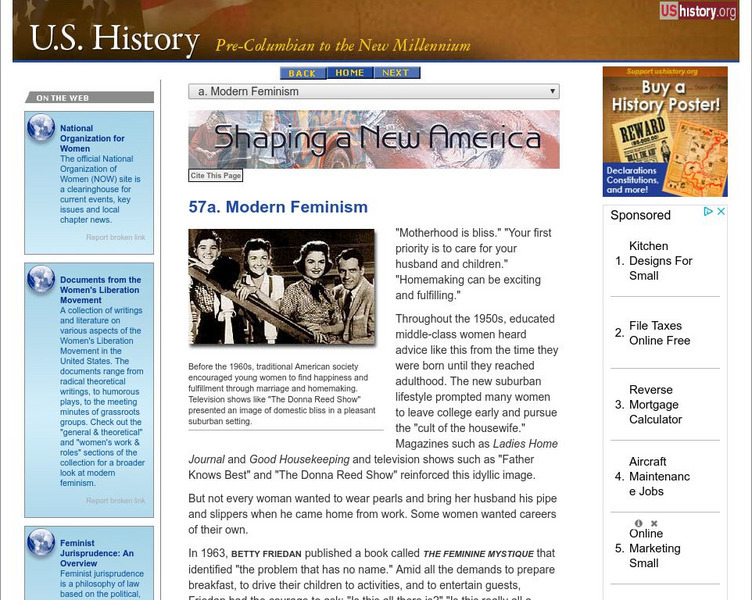Hi, what do you want to do?
Curated OER
Picture the 60s
Learners consider how the 1960's impacted Great Britain. In this contemporary history lesson, students visit selected websites to discover information about the decade, popular culture, and women's rights.
Curated OER
What do they want? Critical Perspectives on the 1960's in the United States
Learners determine that history is a field of study that can help them understand themselves and the people around them. By reading sources by and about people with many of the same interests and concerns that they have and learning to...
Curated OER
Baby Boom and the Culture of the 1950's
Eleventh graders explain the causes, course, and consequences of the United States' role in World War II.
Curated OER
Analyzing the economic, political, social, and cultural transformation of the United States since World War II
Eleventh graders examine political issues in the United States between 1936 and 2000. In this American history lesson, 11th graders study the economy, education, government, civil rights, and sports of this time period. Students compare...
Curated OER
Miss America
The first part of this article by PBS on the Miss America pageants can be used in a health class when it's time to talk about body image. There are links to related articles. There are some great questions for discussion. There are ideas...
Curated OER
The Cuban Missile Crisis
Students reflect on the events that lead up to the Cuban Missile Crisis in the early 1960s. In this history lesson plan, students explore the conflicts between the United States and the Soviet Union revolving around missiles in...
Curated OER
American Pop Icons
Students analyze art and decide if the images are an attempt to celebrate or criticize American Popular Culture of the fifties and sixties and discuss how successful "Pop Art" mirrored society. Students also discuss the difference...
Curated OER
It is Our Right-Don't Waste It!
Students explore the basic rights granted to all American citizens by the U.S. Constitution in the light of women's issues. The women's suffrage movement, the role of Susan B. Anthony, and the timeline of events on voting rights are...
Curated OER
The Sixties Protests and Social Change
Students identify, examine and analyze photographs of the sixties to determine the forces of social change at work in America during this decade. They determine the goals of each movement and the methods used by each to achieve those goals.
Curated OER
Stampin' Around Chicago
Students discuss the United States Postal Service and choose an artifact from one decade. In this art lesson, students research how the artifact chosen relates to Chicago and the United States. Students create their own postage stamp...
Curated OER
Modern Counterculture Movements
Students prepare a presentation examining anti-establishment activity by groups in society today. They prepare a presentation, on poster board or presentation software, about one contemporary protest group.
Curated OER
Focused Learning Lesson
Eleventh graders analyze charts and primary source documents to compare life in the 1940s and 1950s. They are encouraged to examine the economy, government, sports and education.
National Women’s History Museum
National Women's History Museum: Betty Friedan
Journalist, activist, and co-founder of the National Organization for Women, Betty Friedan was one of the early leaders of the women's rights movement of the 1960s and 70s.
Digital History
Digital History: Feminism Reborn
This comprehensive survey of the women's movement during the 1960s and 1970s documents women and politics, women's wages, legal discrimination against women, stereotypes of women, women's rights legislation, and women's rights...
PBS
Pbs Learning Media: You Decide: The Women's Movement? | a Biography of America
This interactive from A Biography of America, offer students the opportunity to join in a debate on whether the Women's Movement of the 1960s and 1970s contributed to the improvement of the lives of women in the United States. Students...
Brown University
The Whole World Was Watching: An Oral History of 1968
Memories of 1968 are collected via interviews conducted by high school students. Important issues during that time include civil rights, Vietnam, the politics of the time and women's rights. There are transcripts of interviews and key...
OpenStax
Open Stax: u.s. History: 29.4 Challenging the Status Quo
Page form U.S. History e-book focusses on the culture of the 1960s and the rise of protest organizations challenging the status quo during that decade. Site contains questions for review, critical thinking, and glossary.
Other
Monthly Review: What Happened to the Women's Movement?
An in-depth magazine article that discusses the history of women's movement, particulary the late-1960s/early 1970s movement. Discusses why the movement faded in the 1980s and how it has been absorped into today's culture.
Department of Defense
Do Dea: Ap Us History: Unit 8: An Age of Confidence and Anxiety
This extensive learning module examines the United States' response to the global uncertainty and instability that followed World War II and the ways that marginalized groups challenged discrimination, and the counter-responses to their...
Khan Academy
Khan Academy: Us History: 1945 1980: The Dark Side of Suburbia
Some background information that sheds light on how suburbia wasn't paradise for everyone especially women and African Americans in the 1950s and 60s.
Khan Academy
Khan Academy: Us History: 1945 1980: Second Wave Feminism
During the 1960s, influenced and inspired by the Civil Rights Movement, women of all ages began to fight to secure a stronger role in American society.
Independence Hall Association
U.s. History: Modern Feminism
The beginning of the feminist movement in the early 1960s led to demands for equal treatment for women in many areas. Read about the literature, feminist leaders, and legislation that attempted to guide this movement.
Digital History
Digital History: The Tumultous 1960's
The decade of the 1960s was a time of protest about the Vietnam War and civil rights, and progressive legislation addressing many problems. Find primary source material, charts, and statistics that cover these topics. Included are...
Digital History
Digital History: The Growth of Feminist Ideology
The evolution of feminist ideology began in 1949 with Simone de Beauvoir's book, "The Second Sex," and soon grew into a widespread reform movement of the 1960s by following the example of the civil rights movement.



























